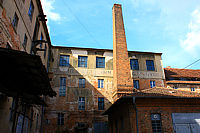M Jewish Entrepreneurs in Frankfurt (Oder) Between the Wars Neumann bedspring factory
 Behind the big crossroads at the Oderturm, in Lindenstraße, begins the Gubener Vorstadt, which lies outside the medieval city walls. In Frankfurt's 14th century heyday, an extension of the trade city soon becomes necessary, and it arises here, in front of the town's southern gates. After the city walls are pulled down in the 19th century, the Gubener Vorstadt develops to become a favoured villa area. Some factories locate in the area, too. Behind the big crossroads at the Oderturm, in Lindenstraße, begins the Gubener Vorstadt, which lies outside the medieval city walls. In Frankfurt's 14th century heyday, an extension of the trade city soon becomes necessary, and it arises here, in front of the town's southern gates. After the city walls are pulled down in the 19th century, the Gubener Vorstadt develops to become a favoured villa area. Some factories locate in the area, too.
At Gubener Straße 9 there was the Siegfried Neumann bedspring factory. The building with the fading inscription "Norddeutsche Bettfedernfabrik Siegfried Neumann" has housed various production sites from its erection in the second half of the 18th century. It was built as a malt house and brewery. From the 1920s, Jewish entrepreneur Siegfried Neumann manufactures bedsprings from unwrought springs here, and sells them in the whole German Reich.
Siegfried Neumann, too, is one of the successful Jewish entrepreneurs in Frankfurt. He has three children with his wife Frieda. The family is well off and the children are brought up in the strict Prussian way. They see themselves as German patriots. Siegfried was awarded the Iron Cross, First Class in World War I. The family has a Jewish background but they do not practise their faith.
The Norddeutsche Bettfedernfabrik is founded in Frankfurt in 1860. On the occasion of its 70th anniversary, the Frankfurt Oder Newspaper writes in October 1930
"On 30 October, Frankfurt's Norddeutsche Bettfedern-Fabrik Siegfried Neumann, at Gubener Straße 9, can look back on an existence of seventy years. The company, founded in 1860 in Frankfurt (Oder), was one of the first in Eastern Germany to undertake the processing of unwrought springs by hand. […] The company has been in the hands of the current proprietor, Siegfried Neumann, for years and has achieved a high state of development. (Frankfurter Oder-Zeitung, 24.10.1930)
In 1912 Neumann takes the factory over from previous owner Julius Glück. Business develops well. In 1922 Neumann is able to move the factory from Große Scharrnstraße, where it has been for years, to Gubener Straße 9. One of the last Jewish factories in Frankfurt, the bedspring factory is confiscated in the Pogrom Night of 9 November. Siegfried Neumann is taken to Sachsenhausen concentration camp. He comes back completely broken and dies shortly afterwards following an operation.
After the Second World War, the VEB (state-owned enterprise) Bärensiegel moves into the factory in Gubenerstraße. Into the 1990s, liquor is produced here, instead of bedsprings. The VEB Bärensiegel only advertises itself with a small sign on the door. Therefore, at least the company inscription of the Norddeutsche Bettfedernfabrik Siegfried Neumann remains on the wall, and you can see it today.
Siegfried Neumann's son Gerhard Neumann (1919-1997) left Frankfurt in 1938 at the age of 19 and later achieved certain amount of fame. Before leaving Frankfurt he had completed his apprenticeship as an auto mechanic. From 1936 to 1938 he studied at the School of Engineering in Mittweida and in December 1939 he left Germany for China. There he fought against the Japanese in a volunteer corps, known from 1942 as the Flying Tigers.
After the war he became a citizen of the USA and worked at first for the Douglas Aircraft Company and then, as of 1948, for General Electric. He stayed there his whole life. At General Electric he developed nuclear-reactor-driven jet engines for aircraft. In 1961 he became Director of the flight engines department and in 1963 Vice President of General Electric itself, a position he held until 1980. He held several patents and received many awards, such as the Goddard Gold Medal, the Guggenheim Award and the Otto Lilienthal Medal, and he was honored in the National Aviation Hall of Fame. Gerhard Neumann died of leukaemia in 1997.
Dorothee Ahlers, student at the European University Viadrina
|